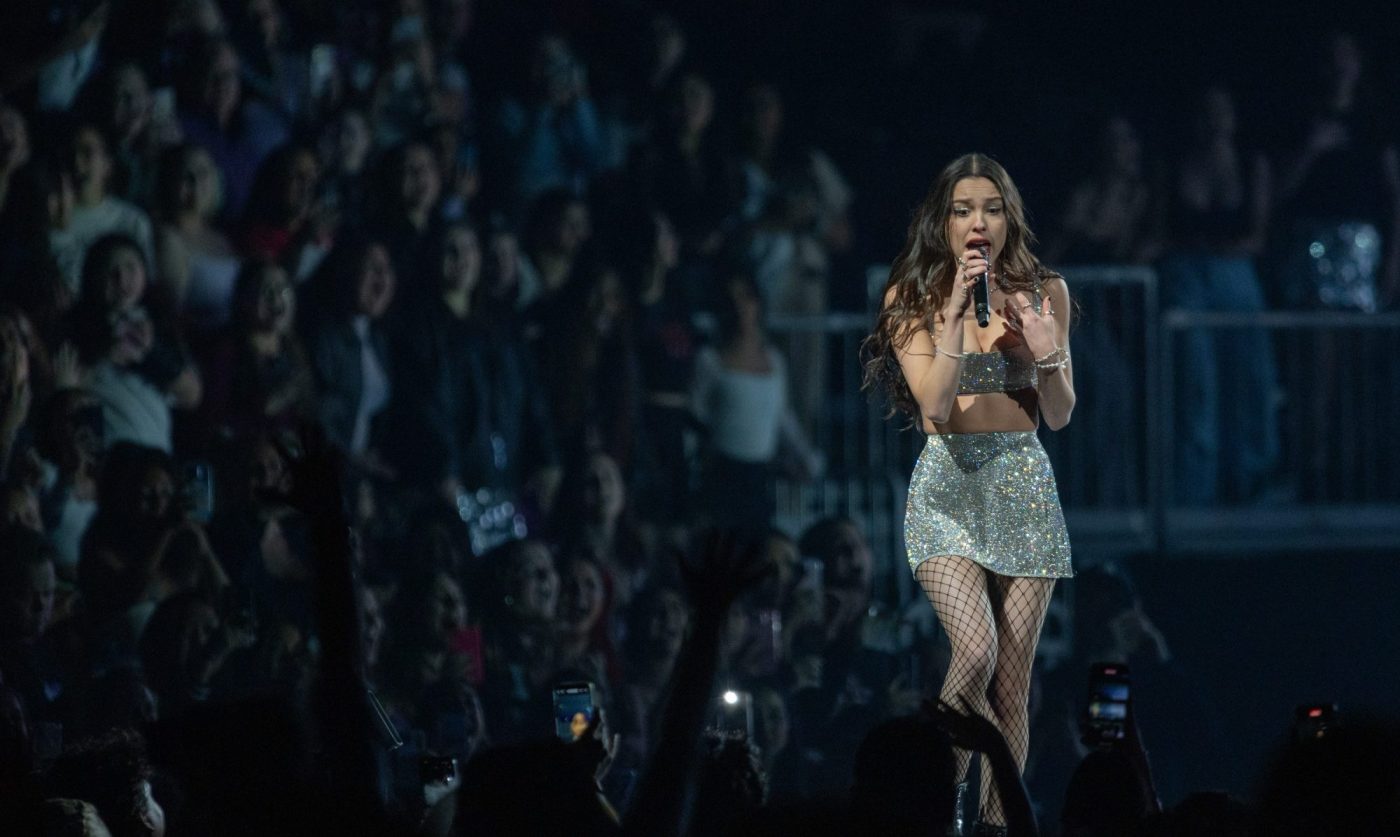
Column: Kids like to swear. Do I blame Olivia Rodrigo? Or do I blame myself?
I turned to the parent next to me and asked what she was going to do about all the, you know … I didn’t want to say it. The what, the parent asked. All of the swearing, the F-bombs and such, I said. This was several weeks ago, at the United Center, where Olivia Rodrigo was playing the second of two shows. Soon, if her new album, “Guts,” was any indication, she would be singing F-words and S-words and lots of other B(ad)-words, loudly and prolifically, and to judge by the lines to get in, she would be singing them to many, many children, middle school-aged and younger.
Which meant, of course, thousands of young children shouting back naughty, naughty words. I wasn’t clutching my pearls in horror. But I was wondering:
Have we all decided — you, me, Olivia, Beyoncé, Taylor Swift — that young children can swear now?
Kim Vanhyning, the parent beside me, from the village of Channahon near Joliet, was attending with her two children, ages 9 and 12, and their grandmother Dorothy, who whispered: The kids recently lost their 7-year-old brother to cancer; they had shirts made that read “(Expletive) Cancer.” They knew swear words more intimately than they liked. And yet, Kim said, for tonight, “the rule is: Sing the swear words, but only tonight.”
At their age, I would have felt weird swearing in front of my mom.
Kim Vanhyning nodded: “I know! I wouldn’t have dreamed of cursing in front of my parents.”
“Yup,” her mother said, confirming it.
But these days — screw it, I guess.
I asked many more parents of young children at the United Center how they planned to deal with inevitable hailstorm of bad words, and the responses were so full of nuance — so lacking in generational clutching of their own pearls — that I wondered if attitudes on when and how children swear had shifted. Sure, parents at an Olivia Rodrigo show are likely more indulgent than most. But even within this sample, there’s subtlety. Mary Davis, from the Chicago suburbs, told me her kids “can’t swear tonight or at home, but they know all the swears and are great at finding words to substitute.” Jenny Grippo of McHenry said, “I’m a bad person to ask. I swear a lot. My daughter” — Avery, 10 years old — “she’s used to it, so I’ll let her enjoy the moment and sing whatever she likes, but she can not say swears at home and she can not swear in front of me.”
“I wish,” Avery deadpanned.
Cry about the decline of morality and coarsening of culture, but I would like to thank Olivia, and Taylor, and Beyoncé, and Nicki Minaj and other contemporary Top 40 singers for their contributions to the mainstreaming of swearing. I really like swear words. Though we don’t have mountains of rigorous university-backed studies on the impact of swearing — and even fewer on its effect on children — we do know from what exists that cursing can help manage emotions, and that people who swear extravagantly tend to be among society’s truth tellers. (Lacking filters, they are regarded as warmer people, more trustworthy.) When Taylor Swift released her first album at age 16, the only use of profanity was one utterance of “damn.” Now 34, her latest album, “The Tortured Poets Department,” has seven songs marked as explicit, and according to online linguistic breakdowns on its lyrics, the F-bomb has become her fourth most frequently used word.
Because, well, (expletive) — just living out in the world erodes our filters.
Before you say Olivia Newton-John never relied on cursing, or that the Beatles became superstars without dropping F-bombs, know there were practical reasons they couldn’t. Partly, federal regulations against profanity on radio stations, which drove record sales. Spotify, YouTube, TikTok, the places people hear music today carry no such regulations.
“I understand why it would be disconcerting for those of us over 40 to be standing in an arena of 8-year-old girls collectively screaming the F-word, but it’s a pretty natural part of the evolution of music and technology,” said NPR music critic Ann Powers. “If your parents were raised on hip hop, metal and punk, they are probably not shocked.”
And yet, the morning after “Tortured Poets Department” was released, during the drive to school, my daughter, age 7, already memorized the chorus of a song that goes “(Expletive) it if I can’t have him,” and was singing loudly, no worries. I was startled, then winced, without being shocked. Olivia R. sings about driving past “the places we used to go ‘cause I still (expletive) love you, babe.” Beyoncé sings, “Don’t be a (expletive), come take it to the floor.” And I could blame them.
But no, it’s me, hi, I’m the problem, it’s me.
“The stories we tell about the way we use language is the real story of how language is changing,” Jason Riggle, a linguist at the University of Chicago, told me. Our anecdotal truths get closer to the emotional truth of how we feel about cursing than clinical studies. When he said that, I thought of my favorite online video ever: A very young British child stands at the window of a suburban living room and tells her mother, “There’s a (expletive) goat outside.” The mother, sensibly, replies, “It’s just a goat.” But the girl, now frowning and serious, corrects: “No, it’s a (expletive) goat.” And indeed, when the camera pans over, there is a goat in their yard.
My daughter asks to watch this video the way she asks to watch Disney+. It’s my fault for (accidentally) showing it to her in the first place, but her love for it doesn’t worry me: It teaches, in its way, that with naughty language, context always matters. It shows the power of the right emphasis. And that well-timed language can generate a visceral thrill.
When I was a kid in the ‘70s and ‘80s, a bad word on the radio could be a shock. Charlie Daniels singing “son of a bitch” in “The Devil Went Down to Georgia,” should you catch the unbleeped version, landed like a slap. I will never forget the Sunday afternoon I was in the car with my Italian grandmother and we were listening to the Pretenders’ “Precious” on the radio and somehow the DJ’s bleeping finger was slow and Chrissie Hynde sang, very clearly: “But not me baby, I’m too precious — (expletive) off!”
“Mio Dio!,” Grandma said.
Swearing is among the great joys of adulthood. I swear a lot. Why wouldn’t my daughter want to? It serves as anger, punctuation, a laugh, a threat, shorthand. Emma Byrne, a scientist who studies artificial intelligence and wrote a book on swearing (“Swearing is Good For You”), described an experiment in which subjects plunged their hands into ice water; those told to swear as they did this reported feeling less pain. If you ever sat in a car with the windows rolled up and cursed at the top of your lungs, you can attest to the therapeutic benefits of shouting bad words.
Not that everyone is as comfortable with swearing as I am.
Even Olivia Rodrigo has said her producers asked if all this swearing is a bit much. My daughter swears mainly to press my buttons, then reassures me that she would never do it at school, or at someone else’s home, or in Target or anything. I choose to believe her.
Related Articles
Prince Harry and Meghan Markle’s charity foundation declared delinquent
George Clooney to make Broadway debut in ‘Good Night, and Good Luck’
Taylor Swift pays tribute to boyfriend Travis Kelce at 87th Era Tour show in KC Chiefs colors
A combustible Cannes is set to unfurl with ‘Furiosa,’ ‘Megalopolis’ and a #MeToo reckoning
Miss Teen USA runner up Stephanie Skinner declines crown after winner’s resignation
Parents do bring up childhood swearing as a concern, said Emily Perepa, a clinical social worker with the Family Institute at Northwestern University, but it’s usually not the reason a child goes into therapy. “Music may help a child express emotions, even if they are not using those words themselves out in the world. But are they quoting a lyric? I am less concerned than if it’s impacting them at home or school. Do they swear without processing the emotions behind a lyric? Are they unconcerned when it’s disrespectful to other people?” Marianne Breneman, a life coach for children from Farmington Hills, Michigan, spends a lot of time listening to swearing in middle schools and is mostly concerned with the kids “who can’t form a complete sentence without swearing. My fear isn’t a limited vocabulary but limited emotional regulation.” She tells parents that middle school is where kids swear as a way to try on personalities. Yet, she added, most parents are “not as concerned with swearing as parents were when you and I grew up.”
Take Laurie Viets of Irving Park, 52. She has 12-year-old twins and a 15-year-old. “We are a swearing family,” she told me. “We have always been. When we first had kids, we asked: ‘Do we stop swearing?’ Well, no, we can’t. Not realistically. I’m not going to be a hypocrite. I just tell (the kids) to swear appropriately. Don’t call each other swear words. And no slurs, of course. And also, don’t make me look bad in front of the other parents.
“Context matters so much with swearing. I was a DJ in Minnesota, which means we also don’t listen to clean versions of songs. Oh, no. We get annoyed when Alexa tries to play the clean versions. It’s like, ‘Alexa, darling, do you not know this family by now?’”
Powers, who wrote a 2017 history, “Good Booty: Love and Sex, Black & White, Body and Soul in American Music,” pointed out that when recorded music began more than a century ago, overt sexual metaphor and innuendo, often sung by female blues singers, was among the most popular music: “Like precode Hollywood, before the FCC stepped in, language in popular music was once freer.” She says the switch began with sometimes raunchy 12-inch versions of popular songs made only for discos. Then came punk, hip hop. Still, music itself is a language, and all languages have profanity. As novelist Rumaan Alam wrote in a New Yorker essay about his kids swearing during pandemic quarantine: “Not swearing is just about decorum, and that’s a kind of facade.”
Profanity is a construct we tentatively agree on.
Fundamentally, it’s letters. Famed linguist Geoff Nunberg likens curse words to “magic spells” entirely dependent on social circumstances. I have been substituting “(expletive)” in this story out of respect to readers who might be offended but chances are I’m not fooling anyone about the identity of the actual words. That’s why I almost never play safe versions of songs for my daughter (although my wife, more skittish, usually does). The American Academy of Pediatrics has argued that exposure to profane language could lead to aggressive, numbing behaviors in children. But other studies conducted on swearing and children found mild behavioral changes at most when kids are exposed to offensive language — assuming the language is not derogatory or abusive.
Timothy Jay, a professor emeritus at the Massachusetts College of Liberal Arts, who has been studying the effects of swear words for 50 years, has heard it all. “What I tell parents is it is inevitable,” he told me. “Your children will swear. It’s part of how we evolve.” In fact, his studies have busted myths about swearing. His 2015 paper for the journal Language Sciences, for instance, shredded the folk wisdom that people who swear frequently have limited vocabularies. His findings found no less English fluency between swearers and non-swearers. (Any difference, he said, had more to do with class and income.) He’s not been surprised by the prolific F-bombs in contemporary pop. It’s a merging of trends: Children swear more than they did a generation ago, but also: since more women entered the workforce, more women swear in public.
Consider it a byproduct of gender equity.
Shocking words, of course — homophobic, racist, sexist — still exist. That’s why, in 2022, both Beyoncé and Lizzo backpedaled from the use of “spaz” in their lyrics; the word is ableist. But context is king. My daughter has told me several times, as if it were a recess legend, about a teacher in Michigan who she heard once said a swear word … in school!
Innocence exists in the world.
Though the fact that “The Tortured Poets Department” has 57 profane words means that “language like this is just mainstream enough now for Taylor Swift to use it without fear of alienating fans,” said Riggle. “It means whatever change in society we maybe feared has already happened.” It could also be, he said — having found in studies that those who initiate swearing in a relationship tend to carry more power — a show of female singers displaying strength.
Certainly, if you’re a parent, as Amy Johnson, executive director of Chicago’s Neighborhood Parents Network, said, it’s hard to punish for swearing now “when there are bigger concerns in the world.” Worrying about naughty words can feel like a luxury.
Still, some parents fight the good fight.
Outside the United Center, Cynthia Escalona of Chicago told me her 12-year-old daughter never swears and is not allowed to swear anywhere. “When she’s singing, she just skips over bad words.” She was not allowed to swear along with Olivia Rodrigo.
And yet, her daughter pointed out, “I will be swearing in my head.”
cborrelli@chicagotribune.com
Olivia Rodrigo performs her song “Bad Idea, Right?” at the United Center in Chicago on March 19, 2024. (Trent Sprague/for the Chicago Tribune)


